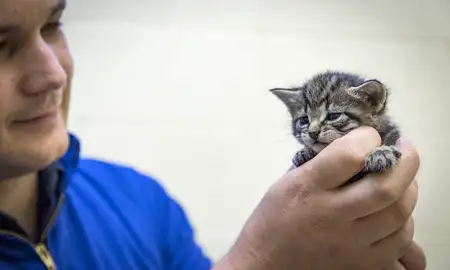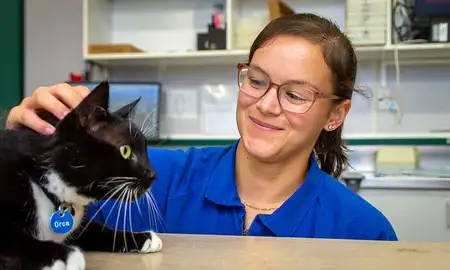
Dr Margreet Hekman
While completing her undergraduate degree in the Netherlands, Dr Hekman came to Massey University for five months for an internship at the Centre for Feline Nutrition. She later returned to Massey to study a master’s degree in animal science.
In 2004, she started working in the monogastric nutrition group as a technician, carrying out trials with a range of animals. After a few years, the technician role became more teaching-focussed, where she taught cat handling to vet students, as well as helping with lab demonstrations for other courses.
“As a technician, you do all the technical work for a trial, but you don’t actually get the whole picture of ‘idea to published paper’. This left me feeling a bit unfulfilled with my work, so I decided to do a PhD. During my internship for my undergraduate degree, I worked on dietary moisture in cats and since then that topic has always been special to me. That’s where the journey into the physiological effects of dietary water in cats began,” Dr Hekman says.
Her research showed that feeding a domestic cat a dry diet every two hours via, for example, an automatic feeder, does not increase the cat’s total water intake compared to feeding the same diet once a day, or that changing the water content of a diet did not significantly change the amount or size of proteins excreted in the urine.
However, there were indications that harmful effects, such as higher urine, plasma and vasopressin (anti-diuretic) concentrations may appear with increasing age when low moisture diets were fed to healthy cats.
Therefore, dietary moisture has meaningful physiological effects in the healthy domestic cat, especially as the cat ages. Primarily feeding a low moisture diet and allowing self-regulation of water intake through voluntary drinking may not secure a high-enough total water intake for the cat’s long-term health. Feeding a high moisture (i.e. canned or pouch) diet ensures a high total water intake, which protects against sustained and possibly detrimental increased levels of key physiological parameters.
Dr Hekman completed her PhD while working at Massey. While it was challenging at times juggling work and study, she enjoyed the experience and support her supervisors provided.
“I enjoyed working with the cats the most, but I probably got the most satisfaction out of learning to think more critically and the in-depth questioning of physiological problems. Like any qualification, there were challenges. I was doing my PhD part-time and my technician job at Massey was full-time during the semesters. This meant that often I’d be completely ‘out’ of thinking about the PhD, which meant it was quite hard to ‘get back into it’ again.
“Despite the challenges, I’m proud to achieve this milestone in my life, and I thank my family, friends and supervisors for the support they have provided me over the years.
“For the moment I still work part-time as a technician, however the next chapter in my life hopefully contains more research as I’m very interested in the nutritional questions and problems that increasing age poses for our cats and dogs.”
Related news
Massey and CHEF celebrate 30 years
Over the last three decades, our feline research centre has been at the forefront of exploring the nutritional needs of cats across the country.

PHD student brings culinary delight to the pet food industry
Animal Science PhD candidate Pavinee Watson gives us an insight into her Massey journey.

Research explores how the management of feral cats can protect native species
New Massey research hopes to improve the management of feral cats for the protection of native species.
